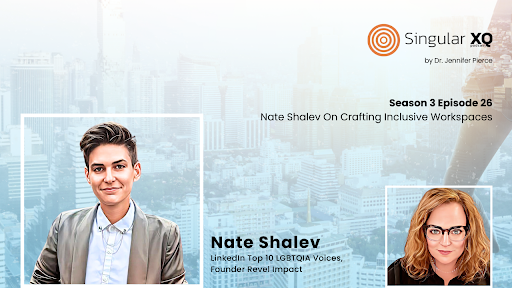Singular XQ 3.26: Breaking Boundaries. Nate Shalev on Crafting Inclusive Workspaces
https://podcasters.spotify.com/pod/show/jennifer-pierce28/episodes/Singular-XQ-3-26-Breaking-Boundaries--Nate-Shalev-on-Crafting-Inclusive-W

I had the distinct and unique pleasure of chatting with Nate Shalev, a leading voice in workplace inclusion while they lives a quiet Brooklyn life with their wife and beagle, Joan Jett. (Nate had me at Joan Jett. Blackhearted for life.)
Nate has a way of making me think things like: why do we wait for others’ pain to force us to reconsider how we approach collaboration and community growth?
Nate is candid and forthcoming and I’m so grateful for it. They discuss their journey in the non-profit and social impact space, highlighting the disconnect between organizations’ external values and internal cultures. They emphasize the importance of genuine inclusivity, especially for marginalized identities in the workplace.
Inclusivity vs. Diversity, Equity, and Belonging
I was fascinated when Nate began a nuanced unpacking of the interrelation of inclusivity with diversity, equity, and belonging. Shalev stresses the need for workplaces to reflect societal diversity and provide necessary support for employees to thrive.
Most importantly, for inclusivity to truly accomplish it’s lofty aims, that inclusivity must be a Proactive Inclusivity. Nate brings up something so simple it might escape our conscious notice but if the individual has to raise concerns and ask for accomodations it is already too late.
Neurodiversity and LGBTQ Inclusion
Nate also delves into the intersection of neurodiversity and LGBTQ inclusion, discussing societal and workplace challenges faced by these communities. Nate points out that the tech industry aligns with neurodivergent and transgender individuals, and the potential for these groups to positively influence tech culture and products has a huge potential for advocacy, impact, and authentic social change.
The podast provides practical advice for advocating for neurodiverse colleagues in the workplace, emphasizing the need for allies to recognize and address potential challenges proactively. There will be resistance when advocating for inclusive practices, with Nate offering strategies to counteract such attitudes. Remember, if we force our colleagues into the position of self-advocacy the damage has already been done. I was particularly moved by Nate sharing that if they ask for an accomodation it is likely because they have already burnt out. Simple things like colleagues stopping by their desk for small talk can throw off an entire morning.
We’d like to know. Have you ever advocated for a neurodiverse or LGBTQ+ colleague? What was the outcome?
If you’ve enjoyed or benefitted from these podcasts, you know what to do. Hit us up on Patreon! We enjoy doing this work for our fellow technologists and the general public who wants to learn more about the tech ecosystem.




